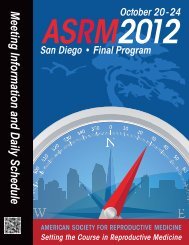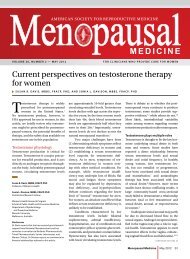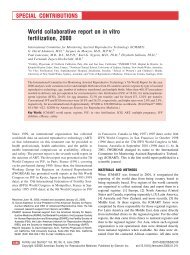scientific program • symposia - American Society for Reproductive ...
scientific program • symposia - American Society for Reproductive ...
scientific program • symposia - American Society for Reproductive ...
Create successful ePaper yourself
Turn your PDF publications into a flip-book with our unique Google optimized e-Paper software.
SCIENTIFIC PROGRAM <strong>•</strong> PLENARY SESSIONS<br />
Wednesday, October 19, 2011 9:00 am – 9:45 am<br />
Plenary Session 5<br />
AMERICAN UROLOGICAL ASSOCIATION<br />
BRUCE STEWART MEMORIAL LECTURE<br />
THE EVOLUTION OF TREATMENT FOR TESTICULAR FAILURE:<br />
ENDOCRINE FACTORS, GENETICS AND MICROSURGERY<br />
Peter N. Schlegel, M.D.<br />
Cornell University<br />
Introducer: Edward D. Kim, M.D.<br />
Needs Assessment and Description<br />
Male factor fertility is an important contributor to couple’s<br />
infertility. The treatment of testicular failure (non-obstructive<br />
azoospermia) has become possible in the past 15 years and<br />
is a rapidly evolving field. New insights into the genetics,<br />
hormonal factors, and treatment options <strong>for</strong> this condition<br />
are being rapidly gained. This is an important area <strong>for</strong><br />
ongoing education <strong>for</strong> all reproductive health professionals.<br />
ADIPOSITY<br />
Endowed by a 1987 grant from Ortho Women’s Health<br />
Monica Skarulis, M.D.<br />
National Institute of Diabetes and Digestive and Kidney Diseases<br />
Introducer: R. Dale McClure, M.D.<br />
Needs Assessment and Description<br />
The impact of the extremes of energy balance and the<br />
quantity of adipose tissue on metabolism and gonadal<br />
function is of great public health importance. Conditions<br />
of energy deficit resulting in hypothalamic amenorrhea<br />
underscore the critical importance of adequate adipose<br />
stores and the adipokine, leptin, <strong>for</strong> normal reproductive<br />
function. In contrast, obesity reaching epidemic status<br />
in adults and children in parts of the developed world is<br />
associated with metabolic derangement and increased<br />
morbidity and mortality across all race, ethnic and<br />
socioeconomic strata.<br />
Hall F 3-4<br />
Moderator: R. Dale McClure, M.D.<br />
61<br />
Learning Objectives<br />
At the conclusion of this session, participants should be able<br />
to:<br />
1. Identify hormonal abnormalities associated with testicular<br />
failure and potential treatments.<br />
2. Describe the effects of genetic abnormalities<br />
on treatment success <strong>for</strong> men with nonobstructive<br />
azoospermia.<br />
3. Outline treatment options, risk and benefits, including the<br />
treatment of microdissection testicular sperm extraction.<br />
ACGME COMPETENCY<br />
Patient Care<br />
TEST QUESTION:<br />
The chance of sperm retrieval is highest <strong>for</strong> men with nonobstructive<br />
azoospermia and:<br />
A. AZFb deletions<br />
B. Klinefelter syndrome<br />
C. Maturation arrest<br />
D. Normal follicle-stimulating hormone (FSH) levels<br />
Wednesday, October 19, 2011 2:45 pm – 3:30 pm<br />
Plenary Session 6<br />
Hall F 3-4<br />
Moderator: Linda Giudice, M.D., Ph.D.<br />
Learning Objectives<br />
At the conclusion of this session, participants should be able<br />
to:<br />
1. Describe the impact of adipose tissue on human<br />
metabolism and reproductive function.<br />
2. Summarize the metabolic activity of adipose tissue<br />
and integrate lessons learned from rare disorders of leptin<br />
deficiency.<br />
ACGME COMPETENCY<br />
Medical Knowledge<br />
TEST QUESTION:<br />
Which of the following statements correctly reflects our<br />
understanding of ovulatory dysfunction and body fatness?<br />
A. Energy deficit, low body fat and low leptin levels<br />
contribute to amenorrhea only in women with eating<br />
disorders.<br />
B. Metabolic disturbance, insulin resistance and gonadal<br />
dysfunction can occur in cases of leptin deficiency.<br />
C. Most cases of extreme obesity are associated with low<br />
leptin levels and insulin resistance.<br />
D. Weight loss results in higher leptin levels and the return of<br />
menstrual cycles.








